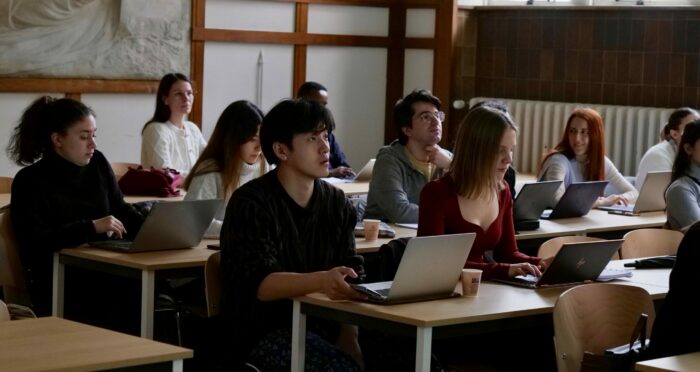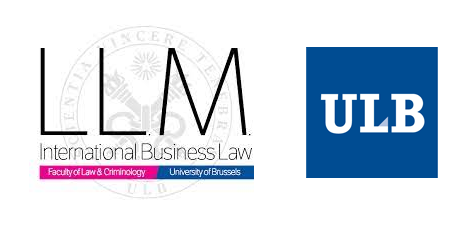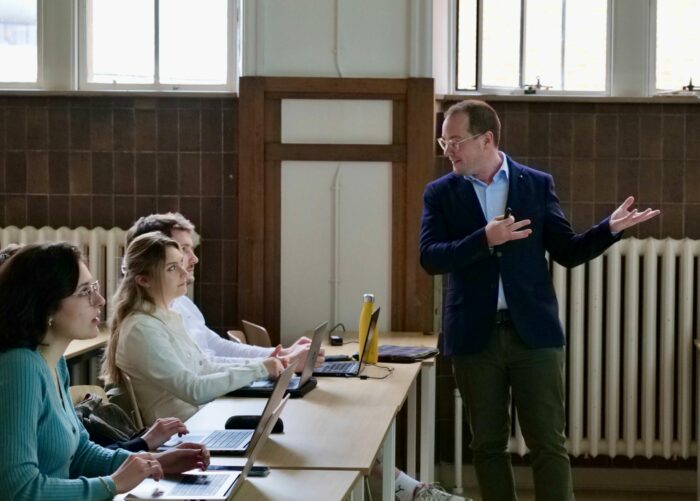Programme
The LL.M. is a full-time advanced post-graduate programme in English. It runs from late September through end May/June and is divided into two semesters with exams in January and June. There is a second session at the end of June during which students can retake exams for any core classes they have not passed.
The LL.M. is structured on the European Credit System, and awards 60 Credits (ECTS). Each of the 8 core LL.M. courses is worth 5 credits (40 credits in total), 1 optional module is worth 5 credits, and a LL.M. thesis is worth 15 credits.
The 8 Core LL.M. Courses are reserved exclusively for LL.M. students. The lectures are held daily during our school term, generally in the afternoon from 3 to 6pm. They provide the primary course load, covering the main areas of international business law. The optional module may meet at a different time of day. The courses have a workload commensurate with a 5 credit course. Since classes are interactive, attendance is compulsory.
It is not possible to enroll in the LL.M. part-time or to start the LL.M. in January. It is also not possible to work full-time while enrolled in the LL.M. Some students manage to balance part-time work with the workload of the LL.M.
The Core Curriculum
International Commercial Transactions
The course covers the main legal aspects of negotiating, drafting and implementing international commercial transactions, starting with a general update on international contracts law (including conflicts of laws), the usual content of international commercial contracts and how they are negotiated. We then dig into the specifics of international sales contracts, corporate transactions, distribution, agency and franchising contracts, transportation, construction and turnkey projects, as well as collaboration and consortium contracts, in each case looking at (international) applicable rules (including a comparative approach), conflicts of laws and usual content (including through case studies).
Professors: Paul Hermant & Erik Van den Haute
Competition Law
This course focuses on the EU competition law regime comparing and contrasting it with the US antitrust system. The EU and the US antitrust systems have served as a model for the antitrust laws enacted by more than one hundred countries around the world.
The course will start with an overview of the institutional and procedural design and the substantive competition law concepts applied by the EU Commission and Courts and their US counterparts.
The course will then cover the practices subject to competition rules with a particular emphasis on cartels, horizontal cooperation, vertical restraints, abuses of dominance and mergers. One specific feature of the course will be its analysis and discussion of actual competition cases drawing on the practical experience of its Professor.
Professors: Patrick Bock & David Hull
International Litigation and Arbitration
This course is intended to acquaint students with the legal challenges relating to the international dimension of litigating commercial disputes before state courts and in arbitration. It focuses on international and European law sources, including the New York Convention on the Recognition of Arbitral Awards, the Brussels Ibis Regulation, Rome I and II Regulations, and the Hague Convention on Choice of Court Agreements. Special attention is given to the means of anticipating problems in contractual stipulations such as choice of court clauses, choice-of-law clauses and arbitration clauses.
The topics that are covered in the course include the following:
- Jurisdiction of State courts over international commercial disputes
- Enforcement of choice of court agreements
- Cross-Border provisional and protective measures
- Choice of the applicable law in contract and tort matters
- Recognition and enforcement of foreign judgments
- Validity and effects of arbitration agreements
- Drafting and enforcement of arbitration agreements
- Applicable law and procedure in arbitration
- Challenge, recognition and enforcement of arbitral awards
- Document request and objection process in arbitration
- Direct and cross examination of witnesses in arbitration, including an interactive workshop
Professors: Michelle Glassman Bock, Pascal Hollander & Arnaud Nuyts
Corporate Governance and ESG
The first part of the course will focus on corporate governance and aims at providing the students with a general framework for understanding and critically assessing regulations, policies and trends in this field.
The introduction is dedicated to the driving forces behind corporate governance on both firm- and country- level, such as ownership structure, agency cost and the key institutions of corporate governance (markets, reputation, contract and law). We will then discuss the “means of corporate governance”, i.e. tools which are (or can be) employed by firms and policymakers to optimize the decision-making process within firms. Selected topics include the allocation of powers between general meeting of shareholders and board of directors, independent directors, conflicts of interest, executive compensation, shareholder activism, related party transactions, freeze-outs, hostile take-overs, and dual class shares.
The final part of the corporate governance part of the course focuses on the “ends of corporate governance”, and examines if and to what extent the interests of other stakeholders, such as employees and creditors, should be taken into account in the decision-making process within firms. This will lead us to the second part of the course, which focuses on the increasing pressure, from a variety of stakeholders (including legislators, regulators, investors, employees, customers and the civil society), put on companies, and their directors and officers, to conduct their businesses in a more sustainable manner, taking into consideration Environment, Social and Governance (ESG) factors.
We will first discuss the emergence and importance of this “ESG megatrend” in general, before reviewing selected key topics in more depth (including sustainable finance, sustainability reporting, human rights and environmental due diligence, transition plans, the impact on commercial contracts and relationships, the associated litigation and liability risks, etc.).”
Professors: Nick Hallemeesch & Guillaume Croisant
International Company Law – International Taxation
This course contains two distinct parts: 1) International Company Law and 2) International Taxation.
International Company Law aims to provide students with an in-depth understanding of key topics of international company law. It focuses on the different approaches across certain jurisdictions to certain basic corporate concepts and on the corporate principles that apply to multi-national corporate groups and on cross-border mobility of corporations. Key topics include: legal personality (recognition, denial, …), the case for or against legal capital (illustrated by the opposition between European and US rules), multinational corporate groups and the issue of the liability of the parent for its subsidiaries (including corporate accountability for environmental hazards), cross-border conversions, mergers and divisions and regulatory competition. Throughout the course, it will be examined how minority shareholders, creditors and employees are protected. The usefulness of European legal forms (such as the Societas Europaea) will be discussed and it will be examined whether a bottom-up approach is an acceptable or desirable substitute to top-down harmonization in Europe. This approach will enable students to understand, analyze and use foreign corporate structures.
International Taxation is intended to acquaint students with the main tax issues that multi-national enterprises may face and the legal instruments and mechanisms designed to solve these issues. Special emphasize will be given to international tax treaties and the rationale of their provisions. The topics that are covered in the course include the following:
- Prerequisite: Fundamentals of Accountancy
- Fundamentals of International Tax Law
- Scope of the International Tax Treaties
- Taxation of Business Profits
- Taxation of Personal Services Income
- Taxation of Investment Income
Professors: Kwinten Dewaele & Caroline Docclo
International Trade and Investment
The first part of the course is focused on trade law. The objective is to provide students with a structured and dynamic understanding of international trade regulation and its relevance for governments and business. It will teach the students how business operators can take advantage of the rights and obligations accruing to Governments under the trading system, the typology of trade disputes and the procedures available to solve trade disputes.
The World Trade Organization is a remarkable institution. It has jurisdiction over a wide range of international economic activity – trade in goods and services, and intellectual property rights (though not investment). In addition to the WTO, trade law is governed by a vast array of regional and bilateral free trade agreements. Several of them – the so-called “new generation agreements” – also contain investment-related provisions and they provide for their own dispute resolution system.
The course will start with a discussion of why countries trade, and of the origins and achievements of the General Agreement on Tariffs and Trade, the WTO’s predecessor. We will then spend time on the WTO and the substantive rules contained in the various WTO agreements as well as the WTO dispute settlement system. We will then highlight the major differences with the regional and bilateral trade and investment agreements. Finally, through case studies, we will explain how the dispute settlement provisions of the various agreements are actually used and provide insights on their practical functioning.
The second part of the course covers substantive and procedural aspect of international investment law. The course will familiarize students with standards of protection commonly found in international investment treaties. Similarly, the course will provide an introduction to the procedure of investor-State arbitration, notably under the ICSID Convention and the UNCITRAL Arbitration Rules. It will also consider the complex relationship of international investment law with other areas of international law. Finally, the course will critically examine the legitimacy of international investment law in light of current attempts to reform the system.
Professors:David Luff & Nicolas Angelet
International Banking and Finance Law
This course is intended to acquaint students with the legal challenges (mainly from a choice-of-law perspective) relating to the international dimension of banking and financial law to help them understand the difficulties that flow from the international character of financial market transactions and banking activities.
The course is divided in two sub-sections : International Finance Law and International Banking Law.
Ivan Peeters teaches the part of the course on International Finance Law focusing on international and European law sources such as the Rome I Regulation, the Prospectus Directive, the UNIDROIT Convention on International Factoring, the EU Insolvency Regulation (recast) and the EU sustainable finance framework. The course is an interactive seminar in which students exchange their views and experience, analyse case law and contract clauses and draft legal documents such as legal opinions. The course aims to provide students with tools to form solid legal reasoning in a highly regulated environment and with insight into the practice of International Financial Law. Although its content may vary according to the legal developments, the course is structured around the following main topics:
1. International Financings
-
-
- International loans and international bonds issues
- Special topic: choice of sharia as applicable law
- Special topic: set-off
- Special topic: sovereign bond issues
-
2. Regulation of International Finance – Special Topics
-
-
- Introduction
- Special topic: public offer and Prospectus Regulation
-
3. Assignment of Claims
-
-
- Introduction
- Special topic: International Factoring
-
4. Sustainable Finance Framework
-
-
- EU Taxonomy Regulation, SFDR and CSRD
- Special topic: Green bonds
-
5. Cross-border Insolvency Proceedings and Collaterals
-
-
- Cross-border insolvency proceedings
- Validity and enforceability of collaterals in a cross-border environment (pledges on assets, pledges on shares, pledge on receivables, mortgages, set-off, close-out-netting, etc.)
-
Jean-Paul Servais teaches the part of the course on Banking Law.
Professors: Ivan Peeters & Jean-Paul Servais
International Law of IP, IT and Data Protection
This course aims to provide students with a workable knowledge of EU Copyright, Neighboring Rights, Trademark and Design, as well as a general overview of some of the issues raised by overlaps of these IP rights, the impact thereon of new technologies and international protection of these rights.
At the end of this course, students will be familiar with the main features of each of these IP rights. In addition, they will be familiar with the most frequent issues arising in running a business (online or offline) based on supplying goods or providing services that are protected by these IP rights.
The course will also address the challenges raised by Artificial Intelligence and the development of e-commerce, notably from the point of view of intellectual property enforcement and unfair commercial practices, with a focus on the ongoing Digital Single market reforms. Finally the course will provide students with a workable knowledge of the EU legal framework on (personal) data and in particular the GDPR, the Data Act and the Digital Services Act.
Professors: Julien Cabay & Benoit Van Asbroeck
The Optional Module
The optional module meets outside of the hours reserved for the Core LL.M. courses. At the beginning of the academic year, students select their optional module which is one of the following:
- Any Law course taught at the university (in English or French), such as European and Private Comparative Law, Data Law, International Mergers and Acquisitions, Terrorism and International Law, etc.
- Internship which is an unpaid internship of 90 hours in a law firm or in the legal department of an international company secured by the student.
- Moot Court/Arbitration Seminar exclusively for LL.M. students, in which students will prepare memorandums and plead in the framework of an international commercial arbitration/litigation mock case inspired by the Vismoot case format.

The LL.M. thesis

The LL.M. Thesis may be written on a topic of the students’ choice linked to the core curriculum, under the one to one supervision of a faculty member. The programme includes thesis writing seminars designed to provide guidance. The thesis is approximately 14,000-16,000 words. It is due on May 15 and an oral defense is held in June.
Legal Status of the Programme
LL.M. candidates who successfully complete the programme are awarded a LL.M. in International Business Law, signed by the Rector of the Université libre de Bruxelles (ULB).
The LL.M., which is organized by the department of continuing education, is recognized in the French Community of Belgium as higher education. It is a level 7 (master level) university programme conferring 60 ECTS organized within the framework and according to the modalities imposed by the law of the French Community of Belgium and recognized as such in Belgium. The LL.M. programme is accredited by the Academy of Research and Higher Education, namely the accreditation body in the French Community of Belgium.
The LL.M. certificate confirming that the progamme has been successfully completed is issued in accordance with the laws of the French Community of Belgium, without conferring an academic rank (which means that under Belgian laws and regulations, the LL.M. does not qualify for access to the Belgian bar or to regulated legal professions in Belgium, though the LL.M. is a recognized higher education programme delivering 60 ECTS at master level which is equivalent to many masters and LL.M. programmes around the world).
The ECTS, or European Credit Transfer and Accumulation System, allows credits taken at one higher education institution to be counted towards a qualification studied for at another within the countries of the Higher European Education Area, and is used as the national credit system within most of these countries. One ECTS credit corresponds to 30 hours of work. The workload for an academic year is set at 60 credits.
The LL.M. does not provide automatic access to a PhD, but the 60 ECTS credits earned qualify towards the 300 ECTS credits required for access to a PhD in Belgium.
Students who wish to seek the academic recognition of the LL.M. in their home institutions or countries are advised to seek information on such recognition before enrolling.

